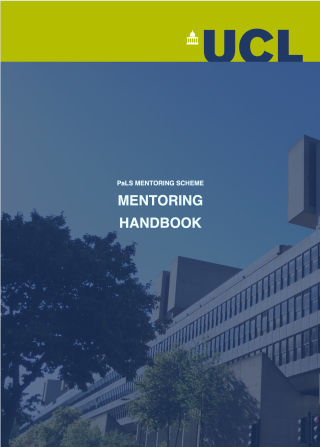Mentoring is a crucial part of supporting career progression. Our mentoring scheme is a light-touch, non-bureaucratic programme open to post-upgrade PhD students and staff of all grades and genders.
We are currently seeking mentors and mentees at all career stages to join the scheme. Please consider joining if you are a member of PaLS. Click here to register your interest, or read below for more information.
Mentoring enables people to achieve their potential through a work-based relationship between two parties who are not connected within a line management structure. At its core, a successful mentoring relationship relies on two important factors:
- the mentor should be more experienced than the mentee and guides the mentee towards an agreed objective that is connected to a career plan.
- the mentee takes primary responsibility for managing their learning with the help of the mentor.
Please feel free to contact us with any questions.
- Contacts
The PaLS mentoring leads are:
- Prof Sam Gilbert: sam.gilbert@ucl.ac.uk
- Dr Katherine Ellis: k.ellis@ucl.ac.uk
You are very welcome to contact us with any questions.
- Who can be a mentor?
Anyone at postdoctoral or more senior level is welcome to join the scheme as a mentor. We encourage both senior staff and those at an earlier career stage to join the scheme. The knowledge and experience of earlier-career staff may be more recent and relevant for some mentees, while the expertise of senior staff may be particularly beneficial for others.
The PaLS mentoring scheme is aimed at staff with teaching, research, and academic roles. There is a separate Faculty of Brain Sciences scheme for staff in professional and technical services roles.
- Who can be a mentee?
All post-upgrade PhD students and staff with teaching, research, and academic roles are invited to join the scheme. There is a separate Faculty of Brain Sciences scheme for staff in professional and technical services roles.
- Can I be both a mentee and a mentor?
Yes! This is encouraged. For example, a postdoctoral researcher might benefit both from mentoring a PhD student and also from being mentored by a more senior member of academic staff.
- How can mentees benefit?
- Receiving advice in shaping career direction
- Receiving guidance on UCL/PaLS policies and procedures for career and salary progression
- Advice on goal prioritisation, planning, and how to resolve issues at work
- Help and advice on how to improve your CV
- Building confidence
- Creating new opportunities for networking
- How can mentors benefit?
- Involvement in a programme of strategic importance to your Division, formally recognised as part of the PaLS Workload Scheme
- Mentoring is a promotion enabling and citizenship activity which is encouraged by the Division and the Faculty
- Funding bodies increasingly value an active mentoring programme and often encourage senior staff to be mentors
- Developing mentoring/coaching skills
- Increased confidence
- Personal fulfilment, particularly satisfaction from seeing junior staff progress
- How are mentor-mentee pairings made?
We will pair mentees with a mentor that is more senior and based in a different Research Department at PaLS, to ensure no conflict of interest.
Mentoring is a voluntary scheme. Each mentor/mentee pair will be required to agree and sign a mentoring agreement setting up mutual responsibilities and expectations. The mentor or mentee will be able to withdraw from the scheme at any point.
- Confidentiality
Mentor-Mentee pairings are strictly confidential.
For the mentoring relationship to succeed, it must be completely confidential. Any information that the mentor receives about the organisation or other individuals will be kept confidential and not relayed to co-workers or exploited for personal gain. The exception to this will be in the case of information which the mentor believes shows the organisation or individual to be at risk. In these cases, the mentor will discuss the course of action with the mentee before talking to the leads of the mentoring scheme. In addition, the mentor may, in general terms, relay concerns expressed by more than one mentee e.g. where there is a concern about a procedure or policy.
- Timeline
We invite members of PaLS to register their interest during September. Mentors and mentees will be paired in early October and will be invited to an in-person induction session at UCL on 11 October (mentors: 2-3pm, mentees: 3-4pm). We would expect mentors and mentees to meet at least three times a year, with an initial expectation of a 12-month basis. The mentoring pairing can then be renewed for another 12 months if both mentee and mentor agree.
Resources
- The PaLS Mentoring Kit: Training materials and useful resources
This handbook has been produced to provide guidance and to help mentor and mentees make the most of this relationship.
A mentoring agreement is a reference document where mentor and mentee agree what are their commitments during the period they work together. We have provided a template. Download the editable word document here ahead of your first meeting.
- Faculty of Brain Sciences Professional Services and Technical Staff Mentoring Scheme
The Division is encouraging professional services and technical staff to join the Faculty Professional and Technical Services mentoring scheme.
 Close
Close


